- Huyett Marketing Department
- 10/28/2020
Tool steels are primarily used to make tools used in manufacturing and in trade professions to work and form metals, wood, plastics, and other industrial materials. Tools must withstand high specific loads – often concentrated at exposed areas. In addition, they may have to operate at elevated or rapidly changing temperatures, be in continual contact with abrasive types of work materials, be subjected to frequent shocks, or perform under other varieties of adverse conditions. Nevertheless, when employed under circumstances that are regarded as normal operating conditions, the tool should not suffer major damage, untimely wear resulting in the dulling of the edges, or be susceptible to detrimental metallurgical changes.
Tools for less demanding uses, such as ordinary hand tools, including hammers, chisels, files, mining bits, etc., are often made of standard AISI steels that are not considered as belonging to any of the tool steel categories. The steel for most types of tools must be used in a heat‑treated state, hardened and tempered, to provide the properties needed for a particular application. Tool steels must also be adaptable to heat treatment with a minimum of harmful effects while maintaining beneficial changes in material properties.
To meet such varied requirements, steel types of different chemical composition, often produced by special metallurgical processes, have been developed. Due to the large number of tool steel types produced by steel mills, under their own proprietary designations, it can be difficult for the user to select those types that are most suitable for any specific application, unless the recommendations of a particular steel producer or producers are obtained.
Common Grades of Stainless Steels
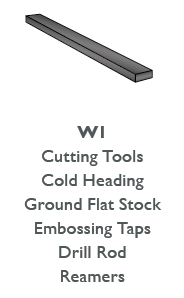
W1 (Water‑Hardened Steel)
This water‑quenched steel heat treats evenly and provides good toughness and maximum wear resistance. High‑carbon content and fine grain structure make it ideal for general use, even without heat treating. Maximum attainable Rockwell hardness is C57 – C60. Melting point is 2800°F. Yield strength is 55,000‑100,000 psi. W1 is used for hand‑operated metal cutting tools, cold‑heading, embossing taps, reamers, cutlery, drill rod, high strength machine keys, and ground flat stock.

O1 (Oil-Hardened Steel)
A non‑shrinking, general purpose tool steel with good abrasion resistance, toughness, and machinability. It is extremely stable with minimal deformation after hardening and tempering. Rockwell hardness is C57 – C62. Melting point is 2800°F. Yield strength is 50,000‑99,000 psi. O1 is used for blanking dies, cold‑forming dies, room temperature cutting tools, drill rod, and ground flat stock.
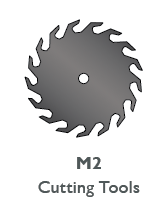
M2 (High-Speed Steel)
This steel resists softening when heated, maintaining a sharp cutting edge. It is easy to heat treat and has minimal loss of carbon (decarburization) after heat treating. Rockwell hardness is C65. Melting point is 2850°F. Yield strength is 105,000 psi. M2 is used primarily for cutting tools.
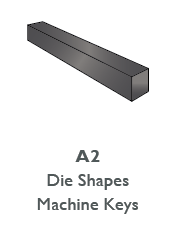
A2 (Air-Hardened Steel)
Made of a very fine grain structure, this steel has excellent abrasion and wear resistance. Ideal for thin parts that are prone to cracking during heat treating. Supplied in non‑resulferized condition. Rockwell hardness is C62 – C65. Melting point is 2620°F. Yield strength is 108,000 psi. Used in situations where wear resistance is critical such as die shapes, slitters, and machine keys.
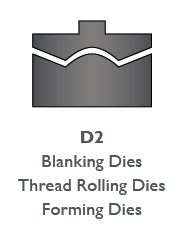
D2 (High-Chrome Air-Hardened Steel)
The high chromium and carbon content in this steel provides superior wear resistance and toughness. A low sulfer content makes it difficult to machine. Rockwell hardness is C62 – C65. Melting point is 2525°F. Yield strength is 111,000 psi. D2 is used for long run tooling such as blanking, forming, and thread rolling dies.
S7 (Shock-Resistant Air-Hardened Steel)
Strong and ductile, this steel is known for its ability to resist failure from shock. It combines high‑impact strength with average wear and abrasion resistance. Rockwell hardness is C59 – C61. Melting point is 2640°F. Yield strength is 105,000 psi.
A6 (Low-Temperature Air-Hardened Steel)
This steel should be heat treated at low temperatures (1525°F – 1575°F). It experiences almost no dimensional changes after heat treating. Rockwell hardness is C61 ‐ C62. Melting point is 2600°F. Yield strength is 110,000 psi.
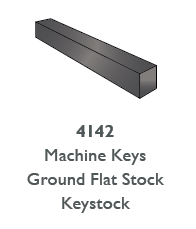
4142
This steel exhibits good wear resistance, toughness, machinability, and high mechanical properties. Prehardened to a Rockwell hardness of C30. Melting point is 2790°F. Yield strength is 130,000 psi. This grade is used for machine keys, keystock, and ground flat stock.

P20
This hardened, general purpose mold steel is suitable for production of machined or electrical discharge machining (EDM) plastic mold and zinc die‑casting components. Supplied prehardened to a Rockwell hardness of C32. Melting point is 2790°F. Yield strength is 130,000 psi. P20 is used for die‑casting dies and injection molds.
Comparisons of Tool Steels
Substantial clarification has resulted from the development of a classification system that is now widely accepted throughout the industry, on the part of both the producers and the users of tool steels. That system is used in the following as a base for providing concise information on tool steel types, their properties, and methods of tool steel selection.


